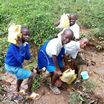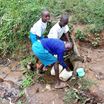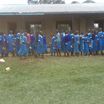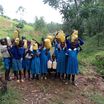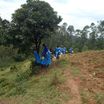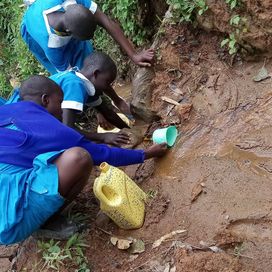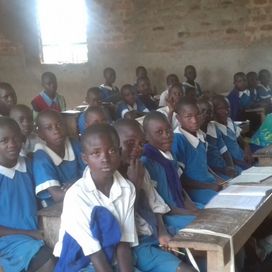Clean Water, New Toilets, New Hand-washing Stations and Hygiene Training. Sabane Primary School has a total enrollment of 725 students. They employ 15 teachers and two support staff. There is also an early childhood program that precedes classes one thru eight.
Students report to school by 6:30am to sweep classrooms, clean latrines, and pick up litter. Morning study hall is from 7 until 7:50, and normal classes begin at 8.
The school cook serves up maize and beans, “amahenjele” to all students. Afternoon classes are held until students are sent to different clubs like sports, poetry, and debate. School is out at 5pm.
Water Situation
There is no water source on school grounds. Students walk out into the community to fetch water from a spring that’s bubbled up to the muddy surface. Cups and jerrycans are turned to their sides to fill up with the dirty water flowing downhill. This water is used to meet all their needs, like for cleaning in the morning, in the kitchen for making lunch, and for drinking.
So much time is wasted because of the several group trips needed throughout the day. When back at the school, this dirty water is poured in LifeStraw containers. To limit the number of trips into the community for water, school staff often restricts the water to just drinking; students don’t have enough water for personal hygiene.
Sanitation Situation
The boys only have three latrines, and the girls have four. These are all in terrible condition. Without enough facilities, long lines form during break and many students don’t make it through by the time class starts.
The LifeStraw containers have taps and can be used as hand-washing stations when the school has the funds to hire local women to fetch water, but this is on rare occasion. As said above, little water can be spared for hygiene and sanitation.
The headteacher is nervous that if the local government’s health department pays them a visit, they’ll be issued a closure notice.
Plans: Hygiene and Sanitation Training
There will be two days for teachers, students, and parents to meet at the school to learn about hygiene and sanitation practices. They will also attend sessions on the management and maintenance of their new rainwater catchment tank, latrines, and hand-washing stations. We will use all of our training topics to empower participants to invest their time in positive behaviors that promote health, prolong life, and enable them to become more self-reliant citizens.
The facilitator will use PHAST (participatory hygiene and sanitation transformation), ABCD (asset-based community development), CTC (child to child), lectures, group discussions, and handouts to teach health topics and ways to promote good practices within the school. The CTC method will prepare students to lead other students into healthy habits, as well as kickstart a CTC club for the school.
Plans: Hand-Washing Stations
The two hand-washing stations are 50-liter plastic barrels on metal stands, and each has a tap to conserve water. These are often delivered by hygiene and sanitation training so they can be used for demonstrations, but always arrive by a project’s completion.
The CTC club will be in charge of filling these stations with water, and will ensure that there is always a cleaning agent like soap or ash.
Plans: VIP Latrines
Two triple-door latrines will be constructed with local materials that the school will help gather. Three doors will be set aside for each gender. And with a new source of water on school grounds, students and staff should have enough to keep these new latrines clean.
Plans: Rainwater Catchment Tank
A 50,000-liter rainwater catchment tank will help alleviate the water crisis at this school. The school will also help gather the needed materials such as sand, rocks, and water from the spring for mixing cement. Once finished, this tank can begin catching rainfall that will be used by the school’s students and staff. Students will no longer waste valuable time journeying back and forth to fetch dirty water.
We and the school strongly believe that with this assistance, standards will significantly improve. These higher standards will translate to better academic performance for these little scholars!
0.169536 latitude, 34.784252 longitude
H2O for Life partners with experienced NGO organizations around the world that build and support clean water, sanitation, and hygiene education projects in schools. These NGO partners cover half the total cost of every project funded through H2O for Life.
When students raise money for a project, 90% of the funds go directly to the project, and 10% supports the work that makes the project possible. This includes choosing trusted partners, managing funds responsibly, checking on projects, and reporting back so students can see the impact of their work.
This helps ensure every project is done well, stays sustainable, and truly changes lives.
In rare situations, we reserve the right to reallocate funds to alternate project(s).
Questions? Ask us at 651-756-7577 or info@h2oforlifeschools.org.

